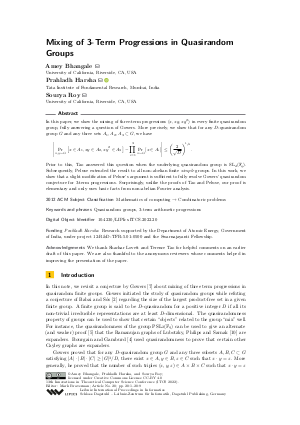Mixing of 3-Term Progressions in Quasirandom Groups
Authors
Amey Bhangale,
Prahladh Harsha  ,
Sourya Roy
,
Sourya Roy
-
Part of:
Volume:
13th Innovations in Theoretical Computer Science Conference (ITCS 2022)
Part of: Series: Leibniz International Proceedings in Informatics (LIPIcs)
Part of: Conference: Innovations in Theoretical Computer Science Conference (ITCS) - License:
 Creative Commons Attribution 4.0 International license
Creative Commons Attribution 4.0 International license
- Publication Date: 2022-01-25
File

PDF
LIPIcs.ITCS.2022.20.pdf
- Filesize: 0.63 MB
- 9 pages
Document Identifiers
Subject Classification
ACM Subject Classification
- Mathematics of computing → Combinatoric problems
Keywords
- Quasirandom groups
- 3-term arithmetic progressions
Metrics
- Access Statistics
-
Total Accesses (updated on a weekly basis)
0Document
0Metadata
Abstract
In this paper, we show the mixing of three-term progressions (x, xg, xg²) in every finite quasirandom group, fully answering a question of Gowers. More precisely, we show that for any D-quasirandom group G and any three sets A₁, A₂, A₃ ⊂ G, we have
|Pr_{x,y∼ G}[x ∈ A₁, xy ∈ A₂, xy² ∈ A₃] - ∏_{i = 1}³ Pr_{x∼ G}[x ∈ A_i]| ≤ (2/(√{D)})^{1/4}.
Prior to this, Tao answered this question when the underlying quasirandom group is SL_{d}(𝔽_q). Subsequently, Peluse extended the result to all non-abelian finite simple groups. In this work, we show that a slight modification of Peluse’s argument is sufficient to fully resolve Gowers' quasirandom conjecture for 3-term progressions. Surprisingly, unlike the proofs of Tao and Peluse, our proof is elementary and only uses basic facts from non-abelian Fourier analysis.
Cite As Get BibTex
Amey Bhangale, Prahladh Harsha, and Sourya Roy. Mixing of 3-Term Progressions in Quasirandom Groups. In 13th Innovations in Theoretical Computer Science Conference (ITCS 2022). Leibniz International Proceedings in Informatics (LIPIcs), Volume 215, pp. 20:1-20:9, Schloss Dagstuhl – Leibniz-Zentrum für Informatik (2022)
https://doi.org/10.4230/LIPIcs.ITCS.2022.20
BibTex
@InProceedings{bhangale_et_al:LIPIcs.ITCS.2022.20,
author = {Bhangale, Amey and Harsha, Prahladh and Roy, Sourya},
title = {{Mixing of 3-Term Progressions in Quasirandom Groups}},
booktitle = {13th Innovations in Theoretical Computer Science Conference (ITCS 2022)},
pages = {20:1--20:9},
series = {Leibniz International Proceedings in Informatics (LIPIcs)},
ISBN = {978-3-95977-217-4},
ISSN = {1868-8969},
year = {2022},
volume = {215},
editor = {Braverman, Mark},
publisher = {Schloss Dagstuhl -- Leibniz-Zentrum f{\"u}r Informatik},
address = {Dagstuhl, Germany},
URL = {https://drops.dagstuhl.de/entities/document/10.4230/LIPIcs.ITCS.2022.20},
URN = {urn:nbn:de:0030-drops-156163},
doi = {10.4230/LIPIcs.ITCS.2022.20},
annote = {Keywords: Quasirandom groups, 3-term arithmetic progressions}
}
Author Details
Funding
- Harsha, Prahladh: Research supported by the Department of Atomic Energy, Government of India, under project 12-R&D-TFR-5.01-0500 and the Swarnajayanti Fellowship.
Acknowledgements
We thank Shachar Lovett and Terence Tao for helpful comments on an earlier draft of this paper. We are also thankful to the anonymous reviewers whose comments helped in improving the presentation of the paper.
References
- László Babai, Nikolay Nikolov, and László Pyber. Product growth and mixing in finite groups. In Proc. 19th Annual ACM-SIAM Symp. on Discrete Algorithms (SODA), pages 248-257, 2008. URL: https://doi.org/10.1145/1347082.1347110.
- László Babai and Vera T. Sós. Sidon sets in groups and induced subgraphs of Cayley graphs. Eur. J. Comb., 6(2):101-114, 1985. URL: https://doi.org/10.1016/S0195-6698(85)80001-9.
- Amey Bhangale and Subhash Khot. Optimal inapproximability of satisfiable k-LIN over non-abelian groups. In Proc. 53rd ACM Symp. on Theory of Computing (STOC), pages 1615-1628, 2021. URL: https://doi.org/10.1145/3406325.3451003.
- Jean Bourgain and Alex Gamburd. Uniform expansion bounds for Cayley graphs of SL₂(𝔽_p). Ann. of Math., 167:625-642, 2008. URL: https://doi.org/10.4007/annals.2008.167.625.
- Giuliana Davidoff, Peter Sarnak, and Alain Valette. Elementary Number Theory, Group Theory and Ramanujan Graphs. London Mathematical Society Student Texts. Cambridge University Press, 2003. URL: https://doi.org/10.1017/CBO9780511615825.
- Persi Diaconis. Group representations in probability and statistics, volume 11 of IMS Lecture Notes Monogr. Ser. Institute of Mathematical Statistics, 1998. URL: https://doi.org/10.1214/lnms/1215467411.
- William Timothy Gowers. Quasirandom groups. Comb. Probab. Comput., 17(3):363-387, 2008. URL: https://doi.org/10.1017/S0963548307008826.
- Martin W Liebeck and Aner Shalev. Character degrees and random walks in finite groups of Lie type. Proc. Amer. Math. Soc., 90(1):61-86, 2004. URL: https://doi.org/10.1112/S0024611504014935.
- Martin W Liebeck and Aner Shalev. Fuchsian groups, coverings of Riemann surfaces, subgroup growth, random quotients and random walks. Journal of Algebra, 276(2):552-601, 2004. URL: https://doi.org/10.1016/S0021-8693(03)00515-5.
- Alexander Lubotzky, Ralph Phillips, and Peter Sarnak. Ramanujan graphs. Combinatorica, 8(3):261-277, 1988. URL: https://doi.org/10.1007/BF02126799.
- Sarah Peluse. Mixing for three-term progressions in finite simple groups. Math. Proc. Cambridge Philos. Soc., 165(2):279-286, 2018. URL: https://doi.org/10.1017/S0305004117000482.
- Terrence Tao. Mixing for progressions in nonabelian groups. Forum of Mathematics, Sigma, 1:e2, 2013. URL: https://doi.org/10.1017/fms.2013.2.
